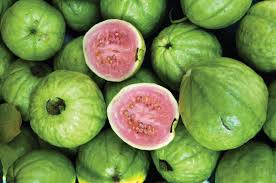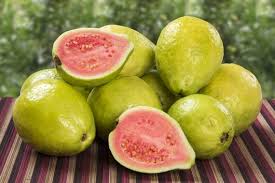Guava fruits and guava leaves improve female fertility: Having babies has been the problems of many homes, situation that might tear down young homes. Children do act as mediator between the father and the mother and sometimes become the link to their stay together.
Some couples might face difficulty in getting babies especially the inability of the woman to be pregnant.
Suggested medication to trigger hormones in the woman’s womb help to some extent. There’s one substance present in Guava called ‘ folate ‘ by scientists.
They found out that folate is important to female fertility by boosting hormones responsible for foetus formation.
In a fertility study, the group of women who took the highest amount of folate daily experienced up to a 20 percent increase in successful births compared with the other groups.
One cup of guava juice is said to contain 20 percent of your daily folate requirements.
There are other compound most of which we had listed that aid the hormones necessary for fertility.
Nutrients like vitamins C, calcium, vitamin B2, niacin, vitamin E, and magnesium, Vitamin B9 all help pregnancy and they are present in guava leaves , fruit and many other benefits:
- Boil guava leaves
- Drink one cup daily.
Read Also: 10 Amazing Health Benefits of taking Guava Fruit during Pregnancy
Guava Plant Benefits

Psidium guajava, the common guava, yellow guava, lemon guava, or apple guava is an evergreen shrub or small tree native to the Caribbean, Central America and South America. It is easily pollinated by insects; when cultivated, it is pollinated mainly by the common honey bee, Apis mellifera.
The natural phytocomponents in guava plant leaves are what contain the antioxidants, specifically carotenoids, anthocyanins and another part of flavonoids.
Guava leaves have been found to be healthy for digestive health, heart health and lowering cholesterol. They have also been found to be good for the immune system and brain health.
Furthermore, the leaves’ antimicrobial, anti-inflammatory and analgesic properties may also be good for oral hygiene, as well as treating coughs and lessening mucus production in the respiratory system.
Tea made from guava leaves may also prevent starch in the foods you eat from forming into sugar, and thus help weight loss if added to a daily diet. The tea can also be good for skin, hair and sleep.
Effect on Fertility
In addition to these myriad of health benefits, the guava plant may also contribute to helping fertility. For individuals with related issues who want to try guava to help, natural remedies include eating the fruit whole, drinking juice made from the guava fruit or drinking tea made from guava leaves.
Effect on Women
For women, the nutrients of vitamin C, vitamin B2, vitamin E, calcium, niacin, and magnesium are believed to help fecundity, and guava is an excellent source of these nutrients. Additionally, guava contains folic acid, or B9, which can contribute to helping develop a baby’s nervous system and avoiding congenital disabilities.
Effect on Men

In addition to potentially providing nutrients that may help female fecundity, guava may also help men.
A study on the effect of ethanol extract from guava plant leaves on sperm production in Wistar rats was published in the African Journal of Medicine and Medical Sciences.
Researchers were examining the role of antioxidants on sperm production. They took 18 rats and divided them evenly into three groups of six.
The animals in group one were given 250 milligrams per kilograms per day of guava leaf extract, and the animals in group two were given 500 milligrams per kilograms per day of guava leaf extract.
The extract was given orally for 53 days. The animals in control group three were given normal saline.
The study found a very slight increase in sperm count for the animals in group one, and a higher increase in sperm count for the animals in group two.
Thus, the researchers concluded the extract from the leaves of the guava plant could be beneficial for sperm production and quality, and may help infertile males due to the natural antioxidants found in the plant.
Read Also: Amazing Health Benefits of Pineapple Peels
Consuming Guava
To ingest guava, humans can eat the fruit whole (including seeds), drink juice made from the fruit or make a tea from the guava leaves.
For guava juice, whole guava fruits can be rinsed, have their ends cut off then the remaining fruit diced. The diced fruit is then combined with clean, drinkable water in a blender, with any preferred sweeteners added.
The mixture is then blended into a smooth liquid, then slowly strained. Any seeds or pulp left in the strainer can be discarded. The final mixture can be chilled before serving.
To make guava leaf tea, take four or five dried or fresh whole guava leaves and wash them well. The leaves can be combined with about one cup or glass of clean water, approximately eight fluid ounces of 236 milliliters.
First, boil the water. Once the water reaches a boil, add the leaves and boil for an additional 10 minutes.
Then, strain the mixture and drink once cool enough to not burn the mouth. Any spices, such as cardamom or cinnamon, can be added to the leaves once they are added to the water to boil. Honey, agave or other sweeteners can be added to the final tea as well.
The guava plant is a great source of natural antioxidants, which may also boost reproduction in men and women who are in need of this type of support.
Scientific Evidence and Case Studies on Guava (Psidium guajava) for Female Reproductive Health
1. Management of Dysmenorrhea (Menstrual Cramps): A randomized clinical trial conducted by Doubova et al. compared the efficacy of a standardized guava leaf extract to ibuprofen in women with primary dysmenorrhea. The study found that the participants taking 6 mg of the extract daily experienced a significant reduction in abdominal pain intensity, comparable to the ibuprofen group, suggesting that guava leaves can help regulate the menstrual cycle and reduce uterine inflammation.
2. Insulin Resistance and PCOS Support: Research by Kumari et al. investigated the hypoglycemic effects of guava fruit and leaf extracts in diabetic models. The results demonstrated a significant reduction in blood glucose levels and improved insulin sensitivity, which is clinically relevant for women with Polycystic Ovary Syndrome (PCOS), as managing insulin resistance is key to restoring regular ovulation and fertility.
3. Uterine Anti-Spasmodic Activity: An investigation by Chiwororo et al. examined the effects of Psidium guajava leaf aqueous extract on rat uterine muscle. The findings revealed that the extract inhibited spontaneous contractions of the uterus, validating its traditional use in preventing miscarriage and managing excessive menstrual cramping by relaxing the smooth muscles of the reproductive tract.
4. Antioxidant Protection for Oocytes: A study by Naseer et al. analyzed the antioxidant potential of guava fruit, specifically its high lycopene and Vitamin C content. The data indicated that these antioxidants effectively scavenged free radicals, which is crucial for fertility as oxidative stress is a known cause of poor egg (oocyte) quality and reproductive aging.
5. Anti-Inflammatory Effects: Research by Ojewole et al. evaluated the anti-inflammatory and analgesic properties of guava leaf extract. The study confirmed significant inhibition of edema and inflammation markers, which supports reproductive health by potentially reducing pelvic inflammation, a condition that can interfere with implantation and tubal function.
Nutritional Value Of Guava Fruits and Leaves (Psidium guajava)
1. Folate (Vitamin B9): Guava fruit is a significant source of dietary folate.
This B-vitamin is essential for DNA synthesis and cell division. Adequate folate intake is critical prior to and during early pregnancy to prevent neural tube defects and supports healthy ovulation.
2. Vitamin C (Ascorbic Acid): Guava contains four times the Vitamin C of oranges. This powerful antioxidant improves hormone levels (specifically progesterone) and increases fertility in women with luteal phase defects, while also protecting eggs from oxidative damage.
3. Lycopene: Found abundantly in pink-fleshed guava, lycopene is a carotenoid antioxidant.
Studies suggest lycopene helps prevent the formation of adhesions (scar tissue) in the pelvic area and may reduce the risk of ovarian cancer, contributing to long-term reproductive health.
4. Magnesium: Guava provides magnesium, a mineral known as a natural relaxant. It helps calm the nervous system, reduce stress (which can disrupt the menstrual cycle), and alleviate the muscular cramping associated with menstruation.
5. Dietary Fiber: The fruit is exceptionally high in soluble fiber. High-fiber diets help the body eliminate excess estrogen through bowel movements, preventing estrogen dominance, a condition often linked to fibroids and fertility issues.
6. Quercetin: The leaves are rich in quercetin, a flavonoid with strong antihistamine and anti-inflammatory properties. Quercetin helps modulate the immune system and improve blood flow to the reproductive organs.
7. Potassium: Guava is a rich source of potassium. This mineral helps regulate fluid balance and blood pressure, which is vital for preventing pre-eclampsia during pregnancy and maintaining overall cardiovascular health for conception.
Frequently Asked Questions About Guava and Female Fertility
1. Can drinking guava leaf tea help me get pregnant?
While not a “magic cure,” it supports fertility by regulating blood sugar (crucial for PCOS), reducing inflammation, and balancing hormones, creating a healthier environment for conception.
2. Does guava help with ovulation?
Indirectly, yes; by improving insulin sensitivity and providing essential nutrients like folate and Vitamin C, it supports the body’s natural ovulation process.
3. Is it safe to drink guava leaf tea during menstruation?
Yes, it is highly recommended during menstruation as it has been clinically proven to reduce the severity of painful cramps and regulate blood flow.
4. Can guava leaves unblock fallopian tubes?
There is no scientific evidence that guava leaves can physically unblock fallopian tubes; this requires medical intervention, though the anti-inflammatory properties may help reduce swelling.
5. How much Vitamin C is in a guava?
A single guava fruit can contain over 200% of the recommended daily intake of Vitamin C, making it one of the best fruits for boosting progesterone production.
6. Is pink guava better than white guava for fertility?
Pink guava is generally considered slightly better because it contains lycopene, a powerful antioxidant that white guava lacks, though both are excellent for health.
7. Can I eat guava seeds?
Yes, the seeds are edible and high in fiber, which helps with hormone balance by aiding in the excretion of excess estrogen.
Do you have any questions, suggestions, or contributions? If so, please feel free to use the comment box below to share your thoughts. We also encourage you to kindly share this information with others who might benefit from it. Since we can’t reach everyone at once, we truly appreciate your help in spreading the word. Thank you very much for your support and for sharing!
Disclaimer: This article is for educational and informational purposes only. The health benefits described are based on scientific research and traditional knowledge. They ayre not a substitute for professional medical advice, diagnosis, or treatment. Always consult a healthcare professional before using any herb or natural remedy for medical purposes.

